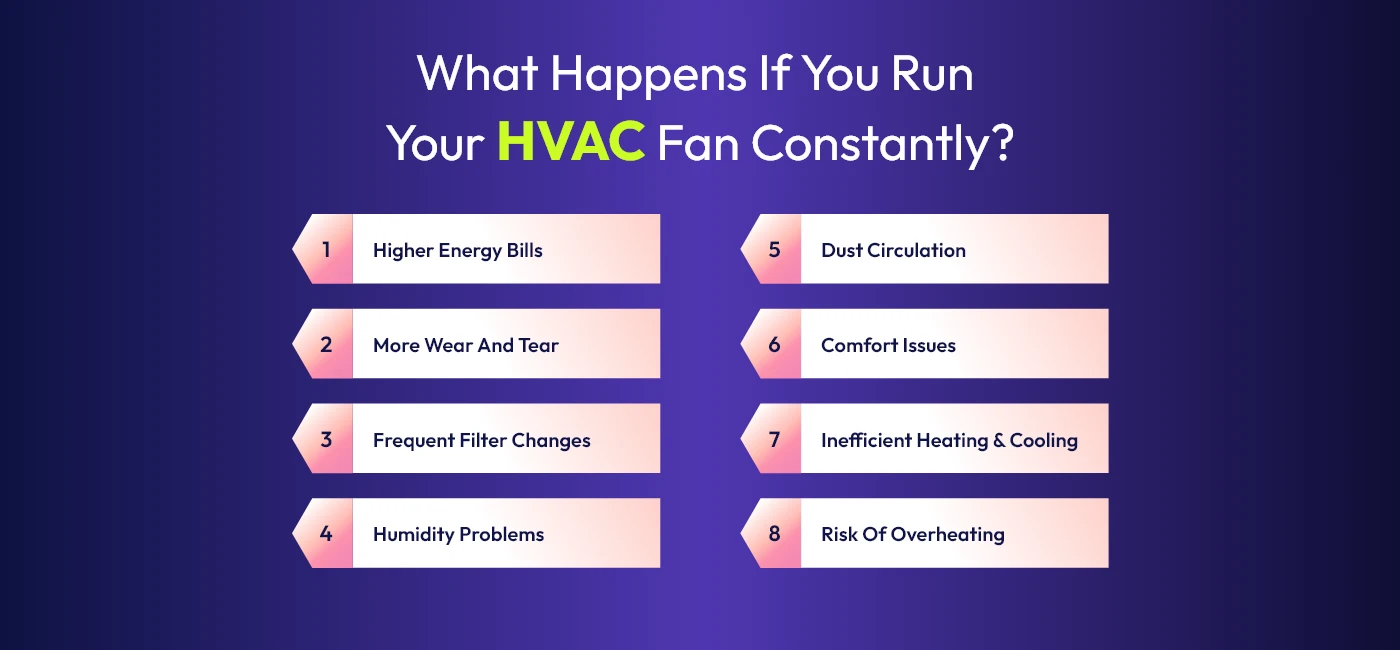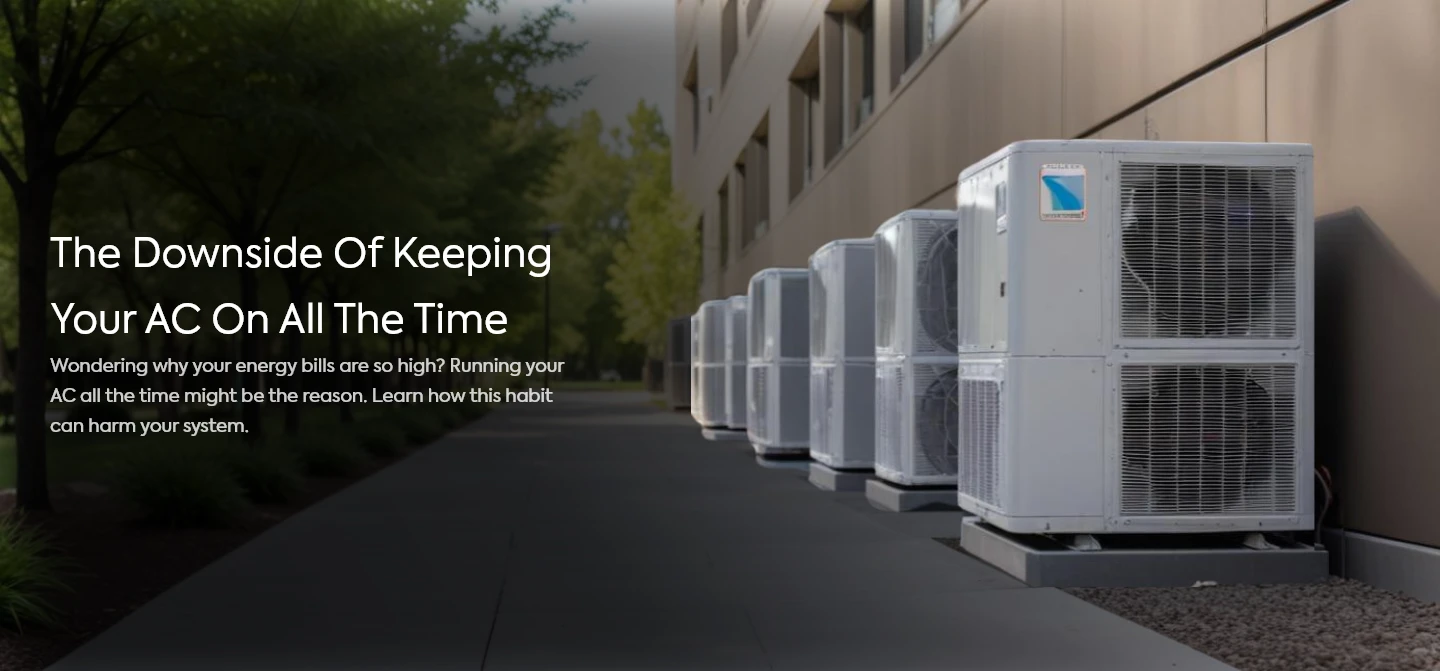Have you ever turned up the AC on a hot day and decided to leave the fan “on” to keep the cool air circulating?
Well, you’re not alone. Many of us do this to maintain a constant level of comfort throughout the house. But what if we told you this seemingly harmless habit might be costing you more than just a few degrees of coolness?
In this blog, we’ll explore the hidden drawbacks of running your HVAC fan continuously and shed light on alternative strategies to keep your home comfortable without breaking the bank.
But, Why Do We Keep Those Fans Running All the Time?
We’ve all felt it – that burst of cool air from the AC that quickly fades, leaving some rooms too hot and others feeling stuffy. But there’s a trick many use to combat this: keeping the AC fan running all the time.
When you set your HVAC fan to “on,” it means the fan keeps blowing air continuously, even when the heating or cooling isn’t actively running. Here’s why people do it:
- Steady Temperatures: Running the fan all the time helps even out the temperature in your home, especially in rooms that tend to feel too hot or too cold.
- Better Airflow: Keeping the air moving constantly means no more stagnant spots, ensuring every room gets enough cool air, which is great, especially in bigger houses.
- Allergy Relief: Some believe that running the fan non-stop helps filter more dust and allergens from the air, making it easier for allergy sufferers to breathe.
But before you commit to this routine, there are a few things to consider. Let’s take a closer look at those.
The Downside of Running Your HVAC Fan Continuously

While there are benefits to continuously running your HVAC fan, there are also some downsides to consider:
- Increased Electricity Bills: The fan, though not the biggest energy consumer in your HVAC system, does use electricity. Running it constantly can add up over time, potentially leading to higher electricity bills. The exact cost increase depends on the size and efficiency of your system, but some estimates suggest it could be similar to running a refrigerator continuously.
- More Wear and Tear: HVAC fan motors are designed for regular use, but not necessarily for nonstop operation. Continuous operation can put additional stress on the motor, leading to increased wear and tear. This could shorten the lifespan of the fan and potentially lead to more frequent repairs or replacements.
- Frequent Filter Changes: With the AC fan constantly pulling air through the filter, it will trap dust and allergens more quickly. This is a good thing for air quality, but it also means you’ll need to change the filter more often to maintain efficiency. A clogged filter can restrict airflow and reduce the effectiveness of your system.
- Impact on Humidity Levels: In very humid climates, continuously running the fan can actually redistribute moisture throughout the house and make it feel muggier. This is because the fan isn’t actively removing moisture from the air, just circulating it.
- Potential for Dust Build-up in Ducts: If your air ducts haven’t been cleaned recently, continuous fan operation could stir up dust and debris trapped inside them. This dust can then be circulated throughout your home and potentially worsen allergies or respiratory issues.
- Reduced Comfort: While some find the constant humming noise of fan comforting, others might find the constant air movement disruptive or uncomfortable. This is especially true in colder months when the fan might be blowing cooler air through the vents even when the heating system isn’t running.
Alternatives to Running Your HVAC Fan Continuously
Here are a couple of alternative approaches to continuously running your HVAC fan:
1. Use the “Auto” Setting on Your Thermostat:
Most thermostat fans have an “Auto” setting for the fan, which only runs the fan when the heating or cooling system is actively working. This has benefits like:
- Energy Savings: By running the fan only when needed, you can save a lot of energy and lower your electricity bills.
- Reduced Wear and Tear: The fan motor experiences less wear and tear, potentially extending its lifespan and reducing the need for repairs.
2. Targeted Air Circulation with Ceiling Fans and Standalone Fans:
If you want better air circulation without relying on the HVAC fan, consider these alternatives:
- Ceiling Fans: They’re great for circulating air within a room, creating a cooling effect and reducing the need for constant air conditioning. In winter, switch the fan direction to push warm air down for better heat distribution.
- Standalone Fans: Placing standalone fans strategically can provide focused air circulation where you need it most. It’s often more energy-efficient than running the entire HVAC system.
By using these alternatives, you can still achieve good air circulation and improve your comfort while saving energy and reducing wear and tear on your HVAC system.
Expert Advice for Efficient HVAC Operation and Maintenance
While keeping your HVAC fan running continuously might seem beneficial, it can actually lead to higher energy bills and strain on your system. Choosing the “Fan Auto” setting on your thermostat promotes more efficient operation.
To enhance air circulation, consider utilizing ceiling fans or standalone units. It’s essential to regularly clean air filters and schedule professional maintenance to ensure your HVAC system runs smoothly and efficiently.
But since every home is different, what suits one might not be appropriate for another. Getting expert advice can help you decide which course of action is best for your particular circumstances.
Get in touch with Good Guys Home Services if you have any questions about how to best optimize your HVAC system or if you need repair services. Our skilled team of professionals is committed to offering HVAC repair services and transforming your house into a cozy, energy-efficient space.
Call us today!
It’s usually better to set the fan to “auto.” This way, the fan only runs when the heating or cooling system is working, which saves energy and reduces wear on the fan motor.
If you run the fan all the time, you should check the filter every month. Change it when it’s dirty. A clean filter helps your system work better and improves the air quality in your home.
Yes, in humid weather, running the fan continuously can move moisture around your home. This can make the air feel muggy and uncomfortable, as the fan doesn’t remove humidity; it only circulates the air.
Keeping your thermostat between 68°F and 72°F (20°C to 22°C) is generally best for comfort and energy efficiency. This temperature range helps your system run smoothly while keeping your home comfortable all year long.
It’s a good idea to have your HVAC system serviced at least once a year. Regular check-ups help keep it running smoothly and allow professionals to catch any potential problems before they become serious issues.






